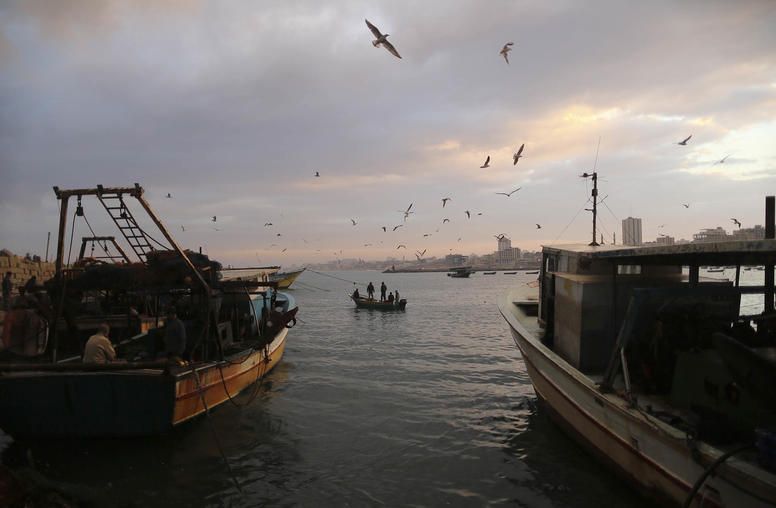Egypt's Transition
The departure of Hosni Mubarak on Friday opens up new possibilities for a transition to real democracy in Egypt. Whether these possibilities will be realized remains uncertain. Steven Heydemann explores the evolving situation.
February 14, 2011
 The departure of Hosni Mubarak on Friday opens up new possibilities for a transition to real democracy in Egypt. Whether these possibilities will be realized remains uncertain. How such a transition will affect peace and security in Egypt and the region is also uncertain; much hinges on whether a transition proceeds smoothly, unfolds with significant but manageable frictions, or collapses under the weight of the many obstacles that lie in its path. Steven Heydemann explores the new and evolving situation.
The departure of Hosni Mubarak on Friday opens up new possibilities for a transition to real democracy in Egypt. Whether these possibilities will be realized remains uncertain. How such a transition will affect peace and security in Egypt and the region is also uncertain; much hinges on whether a transition proceeds smoothly, unfolds with significant but manageable frictions, or collapses under the weight of the many obstacles that lie in its path. Steven Heydemann explores the new and evolving situation.
- What will be the Military's role?
- How will this impact U.S. relations?
- How will this impact Egypt's relationship with the region?
- In terms of preventing conflict in the days ahead in Egypt, what are some of the lessons learned over the years that might be instructive to avoid violence in this transitional period.
What will be the Military's role?
A smooth transition to real democracy offers reasons to hope that Egypt will emerge as a source of regional stability. Democracy is likely to mitigate a number of drivers of conflict within Egypt, including the alienation and frustration that drove young Egyptians to join extremist movements. A democratic parliament that reflects Egypt's political diversity is likely to honor Egypt's international treaties, including the 1979 treaty with Israel.
Under democracy, the Egyptian army will not be involved in politics, but will continue to provide for Egypt's national defense and will remain an important and respected institutional presence in Egyptian society. The military is unlikely to support dramatic shifts in Egypt's regional policies, or its orientation toward the U.S. Under Mubarak, especially during the last decade, Egypt lost much of the regional influence it exercised in previous years. A newly democratic Egypt is likely to regain regional influence, and could serve as a potential model for peaceful political transitions in other countries in the region.
How will this impact U.S. relations?
America's relationship with Egypt will change, and it would not be surprising to see new frictions and tensions arise as the longstanding U.S.-Egyptian partnership is redefined. The close bonds between the United States and Hosni Mubarak angered many Egyptians. The legacies of this relationship, however, are not an insurmountable barrier to a revitalized U.S.-Egyptian relationship, one in which two democracies engage one another as equals with respect, and with recognition that the U.S. and Egypt have many shared interests--including concerns about the regional influence of Iran and its proxies, and of Iran's nuclear program. What will be especially important in determining how the relationship unfolds is the conduct of the U.S. during this delicate transitional period. American support for democratic change in Egypt offers a strong foundation for further efforts to assist Egyptians--on terms defined by Egyptians themselves--in consolidating their gains and moving their country toward a democratic political order.
How will this impact Egypt's relationship with the region?
Egypt's relationship with Israel will also change, and Israelis are understandably nervous about the direction such changes will take. There is fear that a democratic Egypt will fall under the influence of religious extremists, though conditions on the ground provide little evidence that this will happen. There is fear that the already cold peace between Egypt and Israel will become even more difficult, or that the peace treaty itself might be abrogated. Statements from Egypt's Muslim Brotherhood reinforce these concerns. Brotherhood spokesmen have not been willing to state unequivocally their movement's support for the peace treaty with Israel.
 At present, however, it is far too soon to predict that the Brotherhood will emerge as the dominant political force in a newly democratic Egypt. The movement has indicated that it does not intend to seek the presidency when elections are eventually held. It has long affirmed its commitment to nonviolence. Its popularity in truly democratic elections has never been tested. Analysts suspect that under democracy, the Brotherhood's share of parliamentary seats will be significant--perhaps 20-30 percent--but not more. Indeed, the Brotherhood will face intense competition for parliamentary seats, including, perhaps, from new religious parties that might emerge in the months ahead. What fears of extremism underscore, however, is the importance of helping the transition that Egypt is now beginning to succeed, and of continuing U.S. support for efforts to ensure that the transition is both conducted in a democratic fashion, and leads to a democratic outcome.
At present, however, it is far too soon to predict that the Brotherhood will emerge as the dominant political force in a newly democratic Egypt. The movement has indicated that it does not intend to seek the presidency when elections are eventually held. It has long affirmed its commitment to nonviolence. Its popularity in truly democratic elections has never been tested. Analysts suspect that under democracy, the Brotherhood's share of parliamentary seats will be significant--perhaps 20-30 percent--but not more. Indeed, the Brotherhood will face intense competition for parliamentary seats, including, perhaps, from new religious parties that might emerge in the months ahead. What fears of extremism underscore, however, is the importance of helping the transition that Egypt is now beginning to succeed, and of continuing U.S. support for efforts to ensure that the transition is both conducted in a democratic fashion, and leads to a democratic outcome.
What questions and issues will the U.S. and the international community be facing in the days and months ahead as the political transition unfolds in Egypt?
The critical issues confronting the U.S. and the International Community in the days ahead concern the procedures and timetable that will define Egypt's political transition, restoring the Egyptian economy, and clarifying Egypt's commitment to existing treaties and international obligations. Of these concerns, the first two loom largest, and the first is by far the most urgent. Initial indications are that Egyptians have already made one critical decision about the structure of a transition: it will not be guided by the existing Egyptian constitution, an instrument that provided a veneer of legitimacy to the authoritarian regime of Hosni Mubarak. This move has strong international support, including from the U.S., but raises questions about how to ensure that the forthcoming negotiations between the regime and the opposition are credible, legitimate, and inclusive, including of the youth who played such an important role in the protests that overthrew Mubarak. Addressing these issues will pre-occupy Egyptians over the days and weeks ahead, and are the subject of significant attention within the U.S. government.
An initial priority, many believe, is to create a level playing field on which transition talks can be conducted. This would include abrogating emergency laws and other legal provisions that obstruct political participation, creating frameworks for negotiations in which regime and opposition participate as equals, and securing the explicit agreement of the military that it will withdraw from political life as a critical step in Egypt's transition to democracy. Providing support for the emergence of a level playing field--creating an enabling environment that reinforces the likelihood of a successful transition--is one way that the U.S. and the International Community can contribute to a process that will be, and should be, the responsibility of Egyptians to manage.
Explore Further
- USIP Tracks the Unfolding Situation in Egypt
- Eye on Egypt and the Middle East
A Snapshot of USIP’s Work on Egypt - Track USIP's appearances in the news



